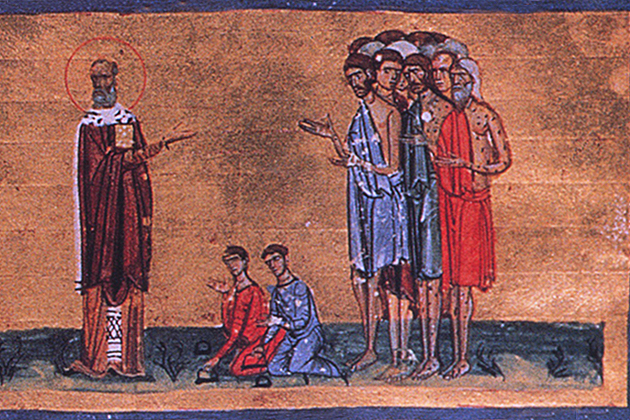
The use of religious gifts by the state to promote social order in the Byzantine Era laid the foundation for many modern charitable practices, according to Daniel Caner, associate professor of history and literatures, cultures, and languages.
The first truly complex Christian society emerged in the Byzantine Empire, or Eastern Roman Empire, an area that included much of Southeastern Europe, the Near East, and the northern coast of Africa, during the 4th to the 6th centuries – a 300-year period that also saw the fall of the Western Roman Empire.
“This was first time that the state became so intertwined with a totalizing religion like Christianity,” says Caner, whose work specializes in the social and cultural history of Late Antiquity. “Starting in the 4th century, you see the state starting to fund churches and monasteries, and encouraging laypeople to give to these institutions as a way to salvation.”
But while Caner says that early Christian philanthropy was part of an earnest attempt to produce a utopian society, and was very different from today’s secular concept of philanthropy, he also notes that it raised complex ethical questions that people still grapple with about wealth scarcity, acquisition, and distribution.
“The post-classical period is a fascinating study of how wealth is held onto by a few people,” says Caner. “In the previous era, wealth was controlled by Roman senators and aristocracy; here you see the system challenged, broken up [with the fall of the Western Roman Empire], and re-formed with another set of elites.”

Caner delves into the details of philanthropy in this early Christian society in his latest book project, The Rich and the Pure: Christian Gifts and Religious Society in Early Byzantium. The project recently earned the support of a yearlong fellowship from the National Endowment for the Humanities – one of only 89 awarded in 2014 – which recognizes individuals pursuing advanced research that is of value to both humanities scholars and general audiences.
Caner first encountered Christian monastic traditions that dated back to the Eastern Roman Empire after traveling to Europe to teach in a Greek high school after college.
“I became interested in the Byzantine legacy – a transitional period from the classical world to the medieval world that was extremely rich in cultural and political changes,” he says.
Among these changes, church and imperial leaders sought to unify the Roman population under a Christianized banner of philanthropia – described by Caner as a tradition of extending clemency and material benefits to all human beings, no matter their status or condition.
“Philanthropy in this era means doing well to others, despite the fact that you know that they don’t deserve it,” says Caner. “Another central idea that evolved during this time was the concept of acting as God’s steward, meaning that no person owns anything and that you should take only what you need and pass on to others.”
Religious gifts and self-interest
In his current book, Caner turns his attention to the emergence of five different types of religious gifts through which individuals passed wealth in this society: alms, charity, blessings, fruit-bearings, and offerings. Each of these gifts was distinguished by several factors, including the source of the gift, the recipient of the gift, and the degree of self-interest of the giving party.
Alms, for instance, is one of the most self-interested and transactional gifts, defined as an individual giving excess wealth or resources to another person who is in a worse situation, in exchange for salvation or penance. On the other end of the spectrum, blessings were given out of sheer generosity and with no expectation of reciprocity – what Caner argues is the first example in Western history of a true gift.
“It is the equivalent of what we have today in nonprofits, an unrestricted gift, or a gift that does not make any demands on its recipient,” he says. “Self-interest in giving is a modern hang-up, but in antiquity everyone knew that gifts had an element of self-interest. That’s what makes blessings so unusual.”
While these gifts serve as evidence for Caner of a culture striving to live an idealized Christian example – through experimenting with wealth redistribution and encouraging people to conceive of what little they have as surplus – he acknowledges that this is not the only interpretation of the period.
“Everything we do in the humanities gives us a fresh perspective on all sorts of issues,” he says. “Marxists would say that these ideals were created to justify or mask the accumulation of wealth by a new elite, but that ignores the real ingenuity and idealism in this novel stage of Christianity.”


